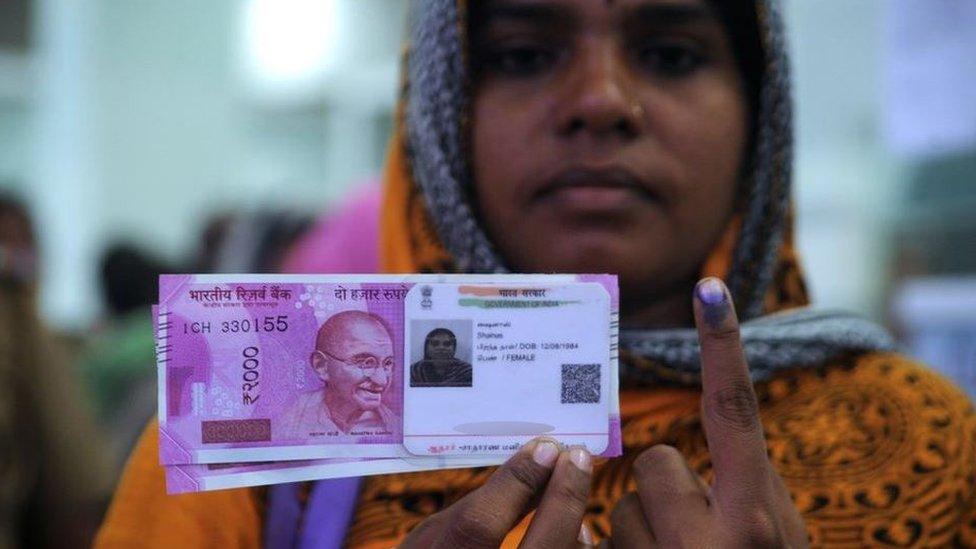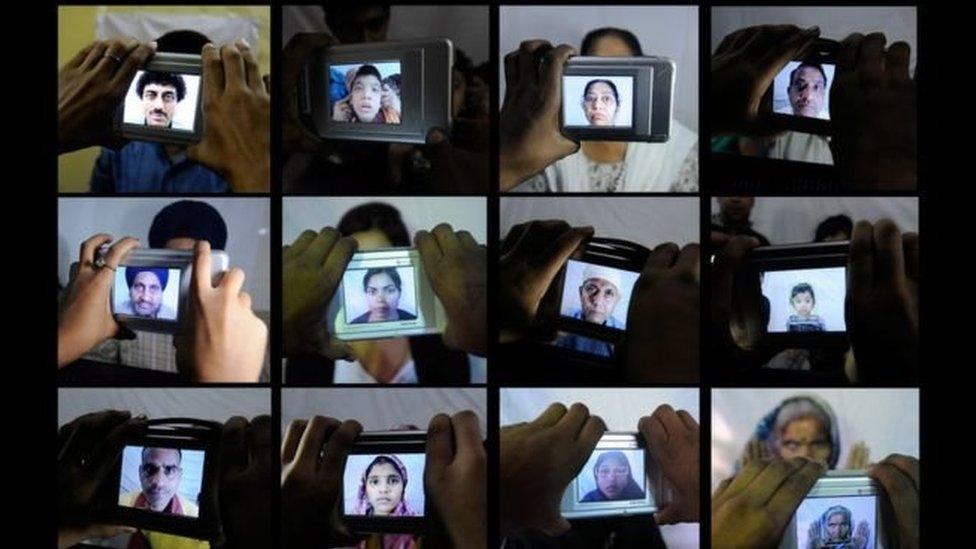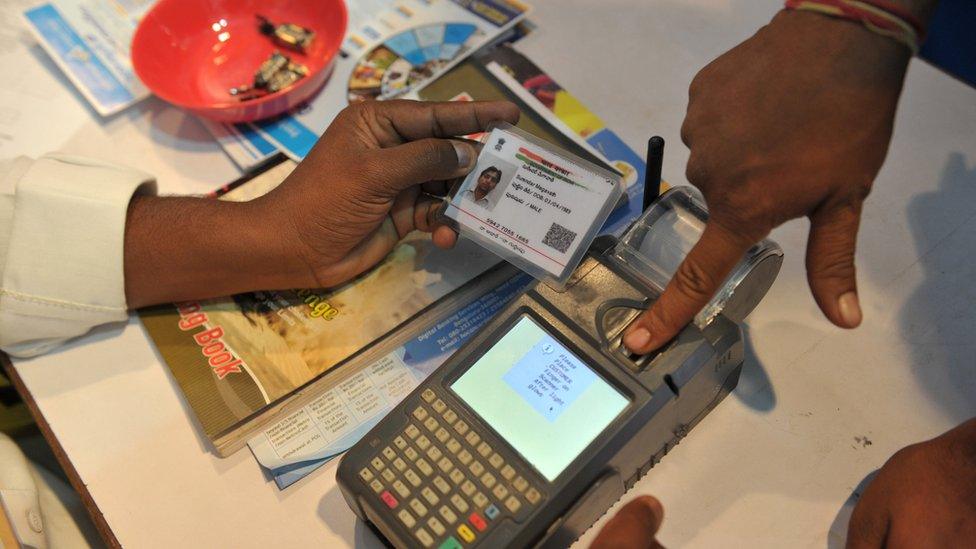Aadhaar: India top court upholds world's largest biometric scheme
- Published

Indians will need the identity number to receive benefits from more than 500 welfare schemes
India's Supreme Court has ruled that the country's controversial biometric identity scheme is constitutional and does not violate the right to privacy.
However the court limited the scope of the Aadhaar scheme, saying it could not be compulsory for bank accounts, mobile connections or school admissions.
The world's largest biometric ID database covers welfare and tax payments and access to social services.
More than a billion Indians have already been enrolled.
Many don't have other forms of identification - only 65 million own a passport and 200 million have a driving licence.
Those who enrolled in Aadhaar received a unique 12-digit identification number after submitting their fingerprints and retina scans. About 30 petitioners went to court to argue that the scheme infringed Indians' privacy.
What did the judges say?
"Aadhaar gives dignity to the marginalised. Dignity to the marginalised outweighs privacy," said the five-judge bench, comprising all the sitting judges in the Supreme Court.
"One can't throw the baby out with the bathwater."
Therefore, they said that people would still need their Aadhaar numbers to access government welfare schemes and to pay taxes.
However, the court said that private entities including mobile phone operators and banks would no longer have the authority to demand customers' Aadhaar numbers and instructed the government to "bring out a robust data protection law urgently".
An Indian woman getting her fingerprints read during the registration process for Aadhaar cards
It also said that schools could not insist on children's Aadhaar numbers to enrol students, further adding that no child could be denied state welfare benefits for the want of an Aadhaar number.
The judgement was not unanimous.
Two judges of the five-judge bench said that they disagreed with several aspects of the judgement, including the manner in which its legality had been determined in parliament.

Cautious optimism on every side
Nitin Srivastava, BBC News Delhi
Anticipating a landmark ruling, large media crews and activists had been stationed inside the sprawling lawns of the Supreme Court since nine in the morning.
Opinions about Aadhaar have always been divided, but when the judgement finally came, everyone was suddenly cautiously happy.
"I wanted privacy while buying a mobile phone connection and am delighted the court has ruled in my favour," Tehseen Poonawala, one of the activists who has challenged Aadhaar, said.
On the other side of the divide, one supporter of the scheme told me that he was glad that Aadhaar had been declared constitutional because "the rich and poor are both benefitting from it".

What has the reaction been?
Largely mixed.
India's finance minister Arun Jaitley has welcomed the verdict, calling it "historic".
Some activists said they were disappointed with the "safe" stand taken by the Supreme Court, although they welcomed the dissenting opinion by Judge D Chandrachud.
Allow X content?
This article contains content provided by X. We ask for your permission before anything is loaded, as they may be using cookies and other technologies. You may want to read X’s cookie policy, external and privacy policy, external before accepting. To view this content choose ‘accept and continue’.
Allow X content?
This article contains content provided by X. We ask for your permission before anything is loaded, as they may be using cookies and other technologies. You may want to read X’s cookie policy, external and privacy policy, external before accepting. To view this content choose ‘accept and continue’.

Allow X content?
This article contains content provided by X. We ask for your permission before anything is loaded, as they may be using cookies and other technologies. You may want to read X’s cookie policy, external and privacy policy, external before accepting. To view this content choose ‘accept and continue’.
The Congress party, which introduced the scheme before it lost power to the current BJP government, welcomed the court decision to prevent private companies from accessing peoples' Aadhaar numbers.
Allow X content?
This article contains content provided by X. We ask for your permission before anything is loaded, as they may be using cookies and other technologies. You may want to read X’s cookie policy, external and privacy policy, external before accepting. To view this content choose ‘accept and continue’.
In fact, that was the most relevant part of the judgement for most Indians - many of whom had expressed unwillingness to link their mobile phone connections to the scheme.
Allow X content?
This article contains content provided by X. We ask for your permission before anything is loaded, as they may be using cookies and other technologies. You may want to read X’s cookie policy, external and privacy policy, external before accepting. To view this content choose ‘accept and continue’.
Allow X content?
This article contains content provided by X. We ask for your permission before anything is loaded, as they may be using cookies and other technologies. You may want to read X’s cookie policy, external and privacy policy, external before accepting. To view this content choose ‘accept and continue’.
Others said that the judgement appeared to be "measured" and "well-balanced".
Allow X content?
This article contains content provided by X. We ask for your permission before anything is loaded, as they may be using cookies and other technologies. You may want to read X’s cookie policy, external and privacy policy, external before accepting. To view this content choose ‘accept and continue’.

- Published27 March 2018
- Published27 March 2018

- Published23 April 2018
